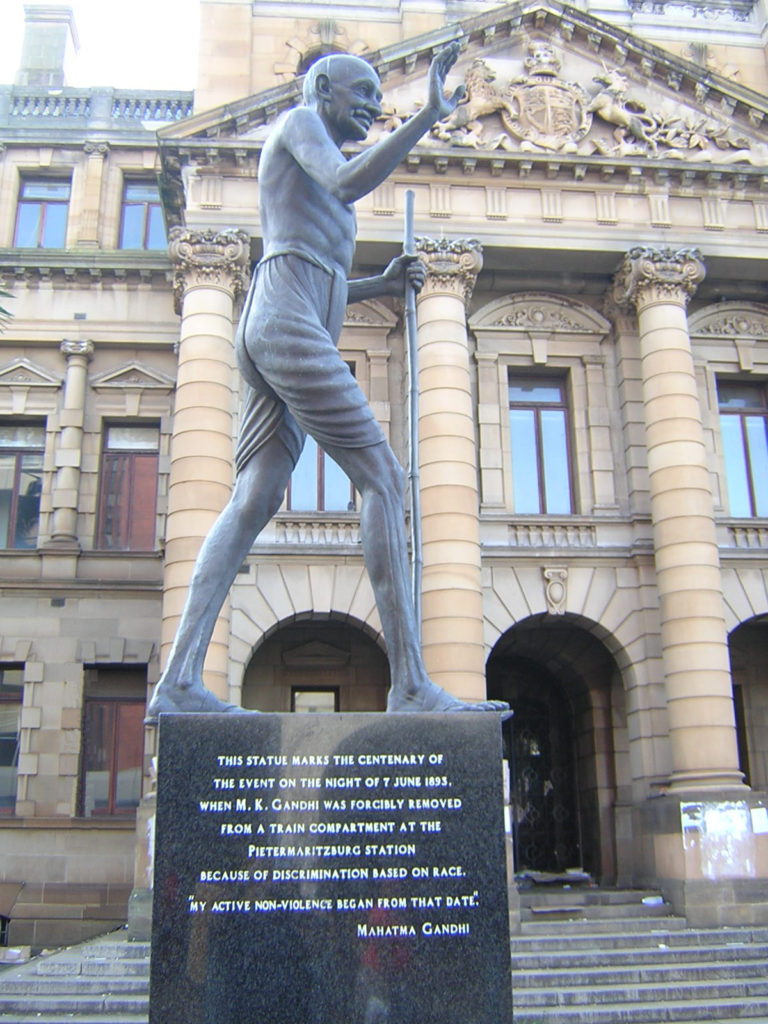
IILJ History and Theory of International Law Workshops are presented with the support of the NYU Global Institute for Advanced Study, Project on International Legal Orders and their Histories.
This bronze statue of Gandhi commemorating the centenary of the incident at the Pietermaritzburg Railway Station was unveiled by Archbishop Desmond Tutu on Church Street, Pietermaritzburg, in June 1993. Photo in Public Domain, by Vishal Bhatia, New Delhi, India.
HowseProfessor Benedict
KingsburyFaculty Director Martti
KoskenniemiProfessor Benjamin
StraumannProfessor
Senior Fellow Jeremy
WaldronProfessor Joseph
WeilerProfessor Mattias
KummProfessor Karin
LoevyVisiting Scholar Liam
MurphyProfessor Noah
RosenblumAssistant Professor
2021
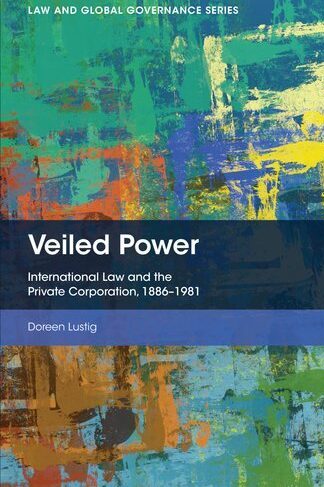
Veiled Power, International Law and the Private Corporation 1886-1981
On 20 April, the IILJ’s History and Theory of International Law Workshops celebrated the release of Doreen Lustig’s Veiled Power: International Law and the Private Corporation 1886-1981. Veiled Power chronicles the emergence of the contemporary legal architecture for corporations in international law between 1886 and 1981. Weaving together five in-depth case studies, the book traces the relationship between two legal ‘veils’: the sovereign veil of the state and the corporate veil of the company. The interplay between these two veils constitutes a conceptual framework for the legal analysis of corporations in international law. Ultimately, contrary to the prevailing belief that international law failed to adequately regulate private corporations, history reveals a close engagement between the two that allowed corporations to exert influence under a variety of legal regimes while obscuring their agency. A recording is available.
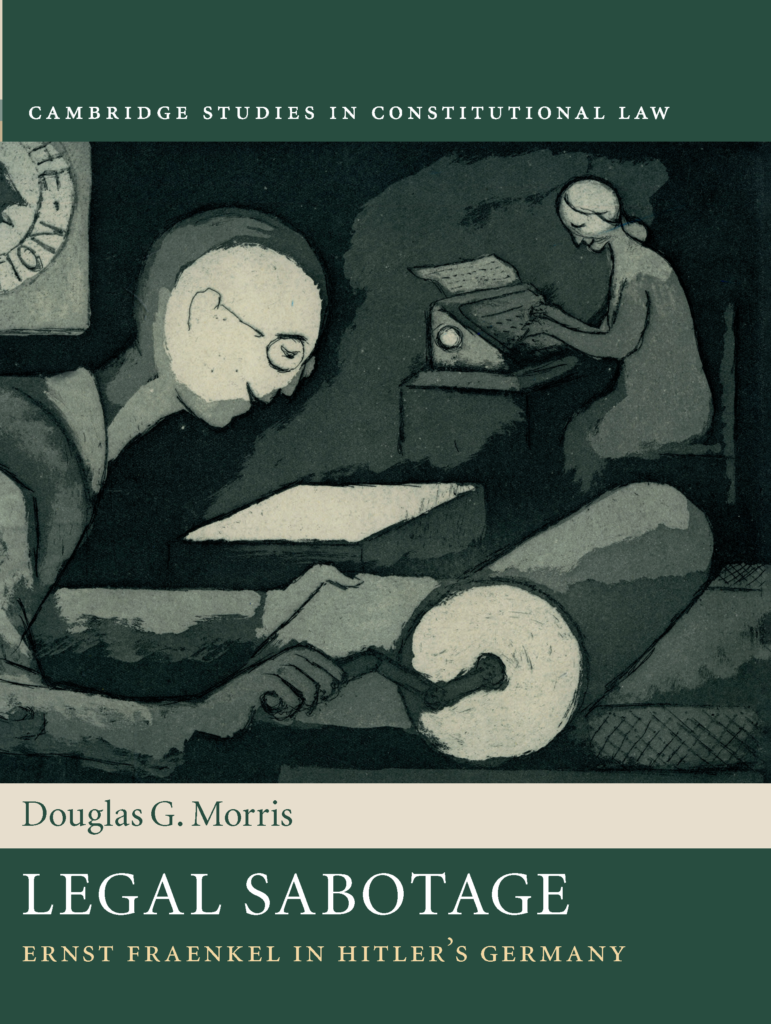
Legal Sabotage, Ernst Fraenkel in Hitler’s Germany
On 16 April, the IILJ’s History and Theory of International Law Workshops presented a conversation with Douglas Morris about his book Legal Sabotage. David Dyzenhaus, Lawrence Douglas, Benjamin Hett, Hassan Jabareen, David J. Luban, Inga Markovitz, and Jens Meierhenrich participated. The Jewish lawyer Ernst Fraenkel was one of 20th-century Germany’s great intellectuals. During the Weimar Republic he was a shrewd constitutional theorist for the Social Democrats, and in post-World War II Germany he was a respected political scientist who worked to secure West Germany’s new democracy. This book focuses on the most dramatic years of Fraenkel’s life, when he worked within Nazi Germany actively resisting the regime, both publicly and secretly. A recording is available.
2020
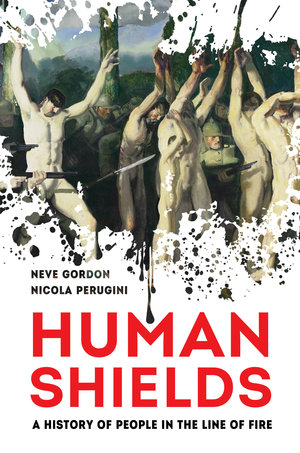
Human Shields, A History of People in the Line of Fire
On 8 December, the IILJ hosted an online book panel discussion of Neve Gordon and Nicola Perugini’s new book Human Shields: A History of People in the Line of Fire (University of California Press, 2020). Participants included the author Neve Gordon (Queen Mary University of London, UK) and commentators Jessica Whyte (University of New South Wales, Sydney), Noura Erakat (Rutgers – New Brunswick), Pablo Kalmanovitz (CIDE – Center for Research and Teaching in Economics, Mexico City); Vasuki Nesiah (NYU Gallatin); and Karin Loevy (NYU Law).

Covid 19 and the Scripts of Emergency Powers
On 18 May, the IILJ’s History and Theory of International Law Workshops and NYU’s Gallatin School held a virtual meeting on Covid 19 and the Scripts of Emergency Powers. Emergency measures enacted across the planet make it vital that scholars, administrators, and journalists grapple with multiple forms of emergency and the implications for executive power. The scholars convened are experts in emergency and crisis in the context of pronounced inequalities. These include past and contemporary colonial, settler colonial and imperial settings, as well as many others. A historical, transnational and relational perspective that highlights the problematique of ‘the routinization of emergency’ in peacetime, allows for critical questions in the current context, and to closely examine, and where warranted contest, long-term institutional changes enacted now in the wake of the pandemic. Convened and moderated by Vasuki Nesiah, Yael Berda and Karin Loevy.
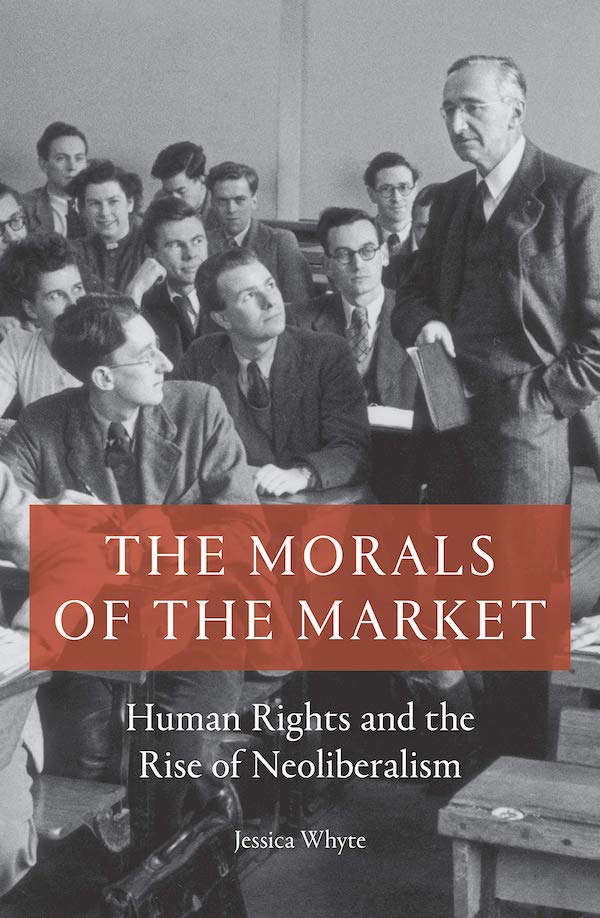
On 4 March, the IILJ History and Theory of International Law Workshops, the Gallatin Human Rights Initiative, and the JSD Program co-sponsored an afternoon reading session with Jessica Whyte on The Morals of the Market: Human Rights and the Rise of Neoliberalism. Why did the rise of human rights language in Anglo-American and European states in the 1970s coincide with the institutionalisation of neoliberalism? And why has the neoliberal age also been the age of human rights? Drawing on detailed archival research on the parallel histories of human rights and neoliberalism from the 1940s onwards, The Morals of the Market uncovers the place of human rights in neoliberal attempts to develop a moral framework for a market society.
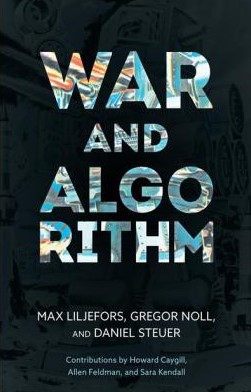
On 3 March, the IILJ’s History and Theory of International Law Workshops presented War and Algorithm. The book look at aspects of the emerging form of warfare from the perspectives of legal studies, philosophy, and visual studies. New military technologies are animated by fantasies of perfect knowledge, lawfulness, and vision that contrast sharply with the very real limits of human understanding, law, and vision. Thus, various kinds of violent acts are proliferating while their precise nature remains unclear. Especially man–machine ensembles, guided by algorithms, are operating in ways that challenge conceptual understanding. The authors Max Liljefors, Gregor Noll, and Daniel Steuer presented their contribution to understanding and resisting algorithmic warfare in ‘an emerging world of war’. Jessica Whyte and Thomas Streinz commented.
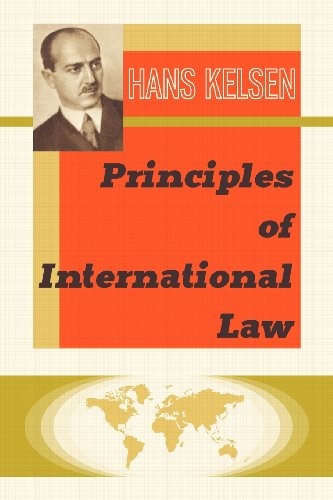
Kelsen’s Contribution to Contemporary Philosophy of International Law
On 3 March, the IILJ’s History and Theory of International Law Workshops and the Contract Theory Colloquium hosted David Dyzenhaus for a discussion of his paper ‘Kelsen’s Contribution to Contemporary Philosophy of International Law’.
Kelsen’s book, Principles of International Law, is an open access text and can be found online through NYU libraries here.

Private and Public Law & Organization of Agreements between States
On 27 February, the IILJ’s History and Theory of International Law Workshops co-sponsored a special session of Professor Richard Brooks’ Contract Theory and Law Colloquium with Julian Arato, David Dyzenhaus, and Michael Waibel. The topic of discussion was ‘Private and Public Law & Organization of Agreements between States’.
Information on the Contract Theory and Law Colloquium at NYU School of Law can be found here.
2019

International Legal Orders as Histories, China and the West
On 26 November, the IILJ’s History and Theory of International Law Workshops presented International Legal Orders as Histories, China and the West. This workshop explored roles of ideas about history in ordering projects past and present. One starting point was the canonical western international law tradition associated with Hugo Grotius and the construction of rule of law. Our second starting point was thought in China on sovereignty and international order, particularly since 1840. Martti Koskenniemi discussed his article ‘Imagining the Rule of Law: Rereading the Grotian “Tradition”‘. Maria Adele Carrai discussed her book China and Sovereignty: A Genealogy of a Concept since 1840. Francesca Iurlaro and Zvi Ben-Dor Benite commented.
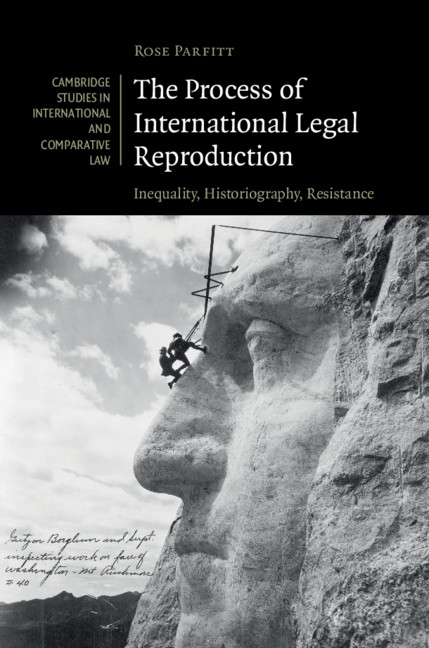
The Process of International Legal Reproduction: Inequality, Historiography, Resistance
On 18 November, the IILJ’s History and Theory of International Law Workshops presented a book talk on Rose Parfitt’s The Process of International Legal Reproduction: Inequality, Historiography, Resistance which develops an innovative ‘modular’ legal historiography to make sense of the paradoxical relationship between sovereign equality and inequality. The workshop featured comments from Nathaniel Berman, Vasuki Nesiah, and Martti Koskenniemi and moderated by Karin Loevy.
Find the book here.

The Emergence of the Concept of a ‘Welfare State’ in British Political Discourse, 1940-1950
On 23 October, the IILJ’s History and Theory of International Law Workshops hosted David Garland. Garland presented ‘The Emergence of the Concept of a “Welfare State” in British Political Discourse, 1940-1950’ . Martti Koskenniemi and Steven Lukes commented. Benedict Kingsbury and Karin Loevy moderated.
Image: Council housing flats at Rockingham estate in south London

The Energy of Concepts: For a Fregean History of Conceptual and Historical Change
On 22 January, the IILJ’s History and Theory of International Law Workshops hosted IILJ Senior Fellow Benjamin Straumann. Straumann presented his paper ‘The Energy of Concepts: For a Fregean History of Conceptual and Historical Change’ defending ‘analytic contextualism’. How can we explain conceptual innovation and change in intellectual history? And how is it possible for concepts sometimes to travel over the historical long-term and to have a causal impact on the history of events?
Commentators included Jeremy Waldron, Tamsin Shaw, Steven Lukes, and Karin Loevy.
2018
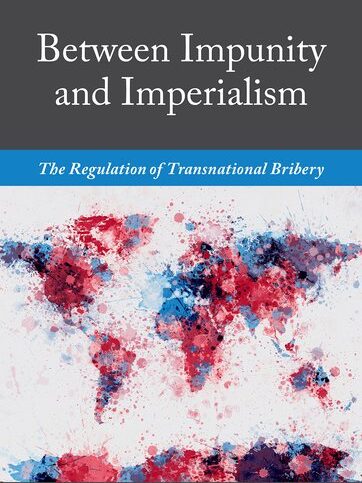
Between Impunity and Imperialism: The Regulation of Transnational Bribery
On 27 November, the IILJ’s History and Theory of International Law Workshops hosted a discussion of Professor Kevin Davis’ book, Between Impunity and Imperialism: The Regulation of Transnational Bribery.
Alexander Cooley, Benjamin Straumann, and Nicholas Wilson were commentators.
Time, Space and Violence in Current Histories of International Law
On 24 October, the IILJ’s History and Theory of International Law Workshops presented Time, Space and Violence in Current Histories of International Law. Participants included Antony Anghie, Lauren Benton, Christopher Casey, Harlan Cohen, David Dyzenhaus, Lisa Ford, Maeve Glass, Robert Howse, Daniel Hulsebosch, Benedict Kingsbury, Karin Loevy, Gerry Simpson, Benjamin Straumann, Natasha Wheatley, and others.
On 25 September, the IILJ’s History and Theory of International Law Workshops hosted Guy Fiti Sinclair, Senior Lecturer at the Victoria University of Wellington Faculty of Law and winner of the ESIL Book Prize. Sinclair presented his paper titled: ‘Forging Modern States with Imperfect Tools: United Nations Technical Assistance for Public Administration in Decolonized States’.

